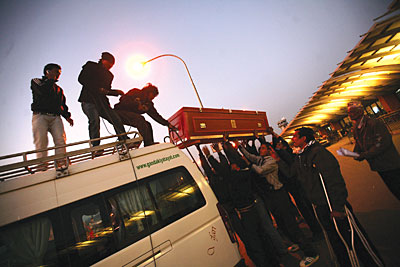 KIRAN PANDAY |
l Migrant labourers leaving Nepal are required to contribute Rs 1,000 to a fund, ostensibly for their benefit. Alam, like his predecessor Lekh Raj Bhatta (UCPN-Maoist), has been accused of using this welfare fund as his personal slush fund, spending freely on foreign trips, fuel expenses, and furniture for his residence.
l Traffic police recently introduced CCTV cameras to monitor driving tests, long notorious for inviting bribes that find their way into the pockets of middlemen, traffic police, bureaucrats, and ministers. Alam has been accused of pressuring Binod Adhikari, who was heading the Department of Transport Management, to remove the cameras. When Adhikari refused to comply, he was transferred back to the ministry.
Alam's is no ordinary case, involving two high-profile instances of blatant corruption. We suffer the consequences of traffic mismanagement every day, and one could not really sink lower than parasitising the one safety net, however inadequate, possessed by those poor Nepalis who keep the country's economy afloat.
Yet the accusations against Alam risk being subsumed in the culture of impunity, political and social, that allows so many to get away with murder. A few headlines, teashop gossip, perhaps a resignation, and Alam will rejoin the ranks of his parliamentary peers, satisfied with his fun in the sun if a little miffed that it had to end before he was good and ready. Indeed, it may be the foreknowledge that all things must pass that makes for the blatant voracity with which people like Alam stuff their pockets.
Yes, we are outraged when we hear of such cases. Our cynicism, and lack of faith in those meant to represent the best of us, mean we assume all charges are true. This in itself is a tragedy. But our outrage is fatalistic, thus impotent. What to do if so and so does such and such? He's not the first, and certainly not the last.
But we are not so impotent as we make ourselves out to be. If it is true that corruption is so pervasive as to be omnipotent, we cannot plead helplessness for too long, pointing crooked fingers at crooked politicians. Sooner or later we have to acknowledge that we, too, have a part in corruption, and are culpable.
After all, the Kushwahas (of 'Does a fish in the sea not drink water?' infamy) and Alams of the world are not simply corrupted by power. Power merely raises their capacity to lower their moral standards. But their morals are flawed to begin with, just like ours. A teacher may favour a nephew over a stranger for admission into his school today; as foreign minister tomorrow, he may make his nephew an ambassador. In the absence of moral or legal checks on corrupt behaviour, everything becomes permissible in time.
We are also culpable in thinking that politics is paramount. There are some who feel that if the politics is sorted out through the formulation of a constitutional and legal framework that lays out rights, responsibilities and checks and balances, then a just and humane society will follow. But perhaps it is the other way around. Perhaps if we re-examine our own relationship to law and order, we will be better equipped to deal with power, and less liable to abuse it.
Of course, it's not easy to make things difficult for yourself by, for instance, refusing to pay that bribe to expedite things. But it may be useful to understand that many of Nepal's systems are designed to be difficult precisely so you will seek the easy (and corrupt) way out. If we focus on streamlining such systems in a way that is fair to all � take the example of CCTVs for driving tests � then we can extricate ourselves from the moral morass of day-to-day life in Nepal.
Then we can hone our outrage to a fine edge when we hear of ministerial misdemeanours, and shout out without shame, "Off with his head!"
READ ALSO:
Bipalis should innovate, ARTHA BEED



